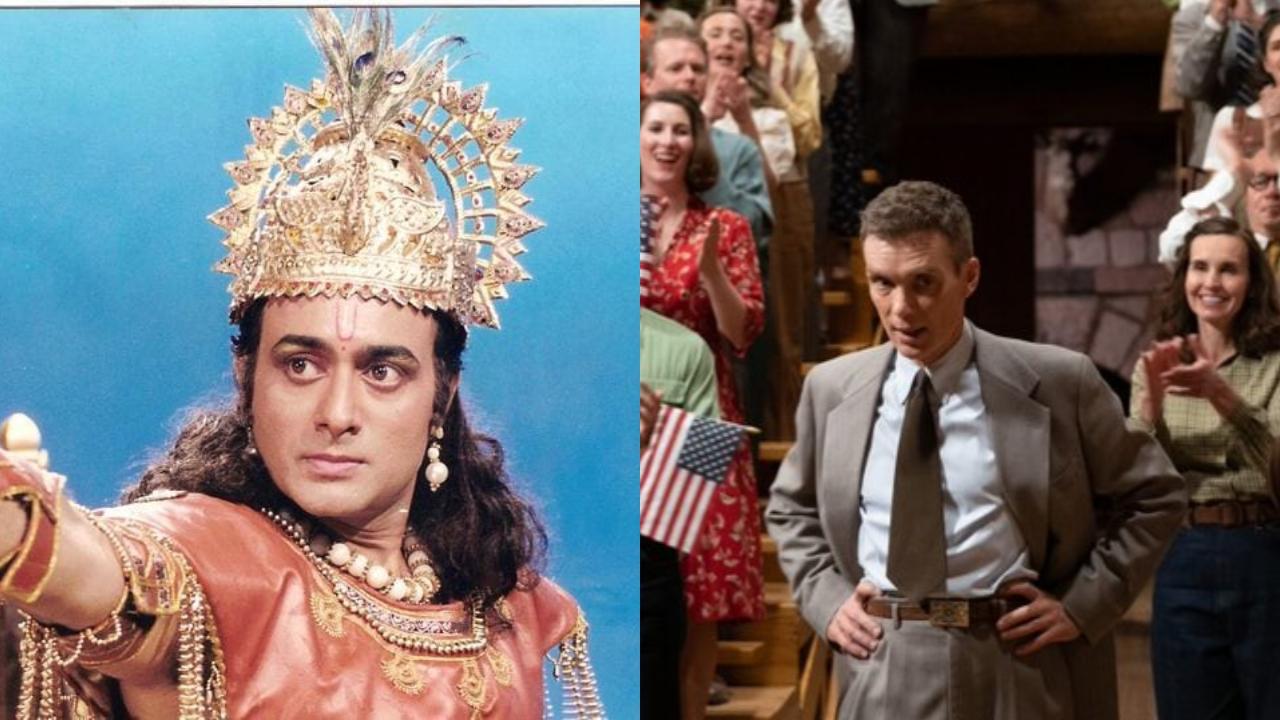Nitish Bhardwaj, who is still known for his role as Lord Krishna in the Mahabharata, voiced his thoughts on the Bhagavad Gita controversy in Oppenheimer

Nitish Bhardwaj in 'Mahabharata' (L); still from 'Oppenheimer' (R)
The latest Christopher Nolan-directed historical film, 'Oppenheimer,' debuted alongside 'Barbie' this past Friday. It is based on the life of American theoretical physicist J. Robert Oppenheimer, who designed the atomic bomb responsible for the devastation of Hiroshima and Nagasaki. Amidst ethical dilemmas, the film has also found itself in the center of controversy for a scene in which a line from the Bhagavad Gita is spoken during a sex scene between characters. This has prompted a significant outcry from the Hindu community.
ADVERTISEMENT
Cillian Murphy portrays the lead character, Oppenheimer, who utters the line while engaging in an intimate scene with Jean Tatlock, played by Florence Pugh. The use of a Bhagavad Gita verse during such a scene has led to a considerable uproar online among Indian audiences.
The controversy also caught the attention of the Ministry of Information and Broadcasting, which is allegedly taking a firm stance on the matter. Nitish Bhardwaj, who is still known for his role as Lord Krishna in the Mahabharata, voiced his thoughts on the issue in an interview with ETimes.
"Gita fundamentally teaches a sense of duty in the middle of a battlefield. Metaphorically, our life struggles, mainly emotional, are the battlefields. The shloka 11.32 was also told to Arjun to do his duty as a warrior, which is to fight the evil. Krishna’s entire shloka must be understood properly. He says that I am the eternal time who will kill everything; so everyone will die even if you don’t kill them. So do your duty," Nitish explained, referring to the specific verse used in Nolan's film.
He talked about understanding the context around the incorporation of the verse in the scene. "When Oppenheimer created the atom bomb & it was used to kill most of Japan’s population, he was himself questioning whether he did his duty properly! His famous interview showed him in tears, which means that he had probably regretted his own invention. He probably saw that his invention will destroy the human race in future & he was probably remorseful. The use of this verse in the film should also be understood from Oppenheimer’s emotional state of mind. A scientist thinks of his creation 24x7x365 days, irrespective of what he is doing. His mind space is consumed fully of his creation and the physical act is just a natural mechanical act."
Bhardwaj urged the audience to appreciate the emotional depth of Nolan's storytelling. He also said that his interpretation of the Nolan film was that it propagated a path of peace, considering the emotional and physical long-lasting ramifications of violence.
"I appeal to people to think of this emotional aspect of Oppenheimer’s important moments of life. Isn’t he proved correct that now we see all the explosive technologies killing our own race - for human greed of territorial & commercial superiority, without any sense of larger duty as an individual or a nation or a planet. The situation today is the same as Kurukshetra, which is why the Brahmins & Kshatriyas consciously did not propagate the Veda of warfare - Dhanurveda. The UN must enforce nuclear disarmament seriously. Nolan’s message is loud & clear!" he implored.
 Subscribe today by clicking the link and stay updated with the latest news!" Click here!
Subscribe today by clicking the link and stay updated with the latest news!" Click here!







